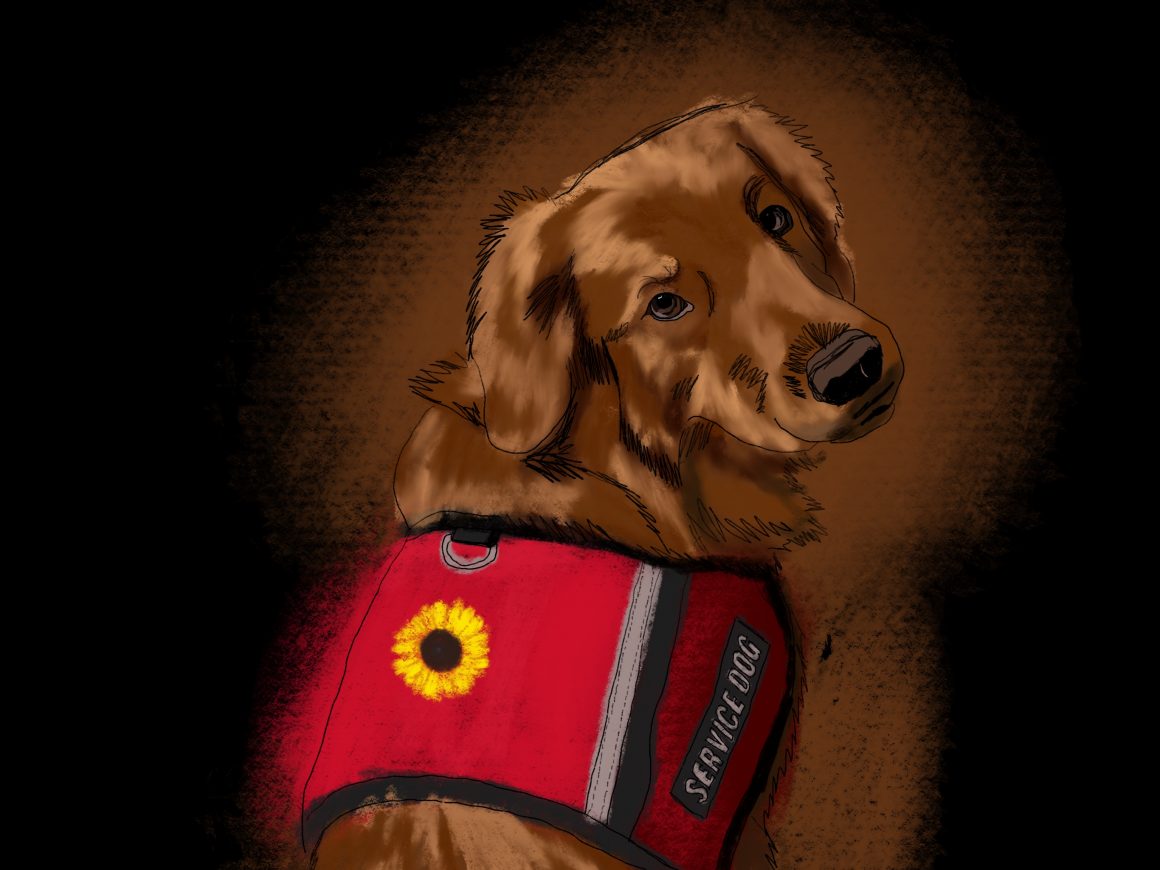
Education needed on campus around service dogs and persons with invisible disabilities
By Julieanne Acosta, March 10 2023—
The University of Calgary’s pets on-campus policy regulates the presence of pets on the main campus to ensure that no health hazards result from the pet. However, the policy clarifies that “pet” does not refer to service animals.
“A service animal is an animal that provides a vital service to persons with disabilities or persons who require assistance due to a medical condition,” read the policy.
Hope O’Keefe — a student at the U of C with a service dog herself — touched on her experiences being a student with a service dog on campus in an interview with the Gauntlet.
“Last year — upon coming here — there were some issues with getting my service dog registered with Alberta, so I had to leave him for a month which caused some issues with my health,” said O’Keefe. “Regardless, I ended up getting him here and since I’ve been here, I find that not many people are educated on etiquette around service dogs.”
Alongside her service dog — a Great Dane named Forest — O’Keefe has faced several experiences that have shown her that more education surrounding service dog etiquette is needed.
“I’ve been working on discussing with people on how to properly advocate for service dogs and try to work on building a better community here so that it is more inclusive to people with disabilities,” she said. “The most recent thing that happened to me was that I was standing at the elevators with my service dog in the library and I had pressed the button when a bunch of people came in front of me. When the door opened, they all rushed into the elevator before me and did not leave me room. The only reason the elevators are here are to accommodate persons with disabilities.”
O’Keefe has been vocal about different types of disabilities people can have to advocate and educate others about invisible disabilities — struggling with invisible disabilities herself.
“Can you look at someone and tell they’re deaf? Can you look at someone and tell that they go through seizures? Can you look at someone and tell that they have a fainting disorder? Most disabilities for persons with service dogs are invisible,” said O’Keefe.
It is important that the campus community knows what to do when coming across a service dog and how acting otherwise negatively affects not only the service dog but the handler as O’Keefe explains.
“No touch, no talk, no eye contact — no eye contact is very big. You can really distract a service dog from doing that,” she said. “Please give us six feet of space in the hallway. If you see someone having an episode, they might not always need help. It’s really good to give them space to let them finish their episode. They have a service dog there for a reason and they are medically trained to assist with these tasks but they need some space and some time to do it and make sure that they’re not distracted while doing so,
“There’s no need to make exaggerated actions — that’s just basic dog etiquette. Please don’t jump up and down and squeal around any dogs because if you do that around a dog that’s not trained, you can get hurt,” continued O’Keefe. “But that alone can cause a service dog to lose focus of their owner and miss a task. Therefore, you’re putting the handler’s life in danger because that is our lifeline — that’s what we rely on.”
Though she acknowledges that some people are uncomfortable or fearful around dogs, O’Keefe explains that these dogs are trained and are only focused on their owners.
“I just want people to be more comfortable around us. I feel so upset for people that are scared in the hallways because they’re not educated enough about service dogs to feel confident walking past me,” said O’Keefe.
In her concluding thoughts, O’Keefe talks about her gratitude for what her service dog has done for her and how these service dogs change people’s lives and deserve to be respected.
“What these dogs do is life-saving and we need to respect what they do and look at them as more of a human that’s a nurse walking beside someone. I would love for people to have conversations about this and be able to advocate for education,” said O’Keefe. “There are people that train their dogs to do that but don’t expect them to automatically do these things. There are different avenues of different types of service dogs.
“I don’t try to put anyone in an uncomfortable position with my dog being present. He’s only there because if I don’t have him with me, I could not be doing the things that I’m doing today. He is here to prevent medical emergencies from happening. I tried to go to university previously and I had to stop. I planned to get a service dog before I ever came back to university because I knew it would make the biggest difference for me — he has made this happen for me,” continued O’Keefe.
To learn more about service dogs, visit the Alberta website. To learn more about O’Keefe and Forest’s story, visit their linktree.
